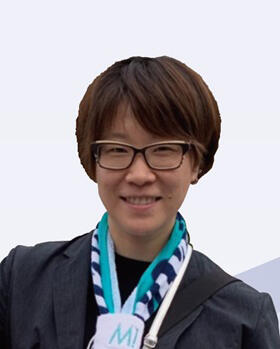
Visiting Associate Professor, Frontier Research Institute for Interdisciplinary Sciences, Tohoku University
Q1. What was the spark that led you to the field of brain research?
A1. "One's own existence under the control of the brain" — TV shows provides the turning point in life
At the age of nine, I saw a TV program called "Brain and Mind," and I was pleasantly surprised. Because we have brains, we possess the ability think, play sports, and have dreams, and from this, I became quite interested in the brain, as it is responsible for controlling my behavior. Consequently, I began to think about becoming a researcher. You might think I was one of those children who did nothing but study. However, from the age of 9 to 18, I was enthusiastic about diving, which led me to participate in a national competition. I do not have many joyful memories associated with diving, because it was a frightening and painful experience for me. However, it did provide me with a pleasant sensation when I was able to dive smoothly into the water, as if it was warmly embracing my presence.
It was during my time as an elementary school student that I decided to delve into the study of sleep. I liked having dreams, but the reason for dreams was not well understood, nor sleep itself. Therefore, I decided to study dreams on my own. When I was a junior high school student, I wanted to be a comedian or an astronaut, but my high school biology teacher reminded me of my original resolution. I then enrolled at a university, as I wanted to study the brain.
Q2. What kind of research are you engaged in?
A2. Discovering Ponto‐Geniculo‐Occipital (PGO) waves in mice for the first time — In pursuit of the relationship between dreams and memories
I was thrilled when I was a senior student at university. I used the slice patch clamp technique to record an action potential from an orexigenic neuron by myself—individuals who lack orexigenic neurons experience sleep disorders. I was also successful in detecting "PGO waves" in the brains of mice for the first time. They are a type of brain wave generated from the brain stem during rapid eye movement (REM) sleep. Research on PGO waves had been frequently attempted since the 1950s‐60s. These waves were detected in the brains of cats and rats; however, it was widely thought that mice, which could have their genes modified, lacked such waves. With the discovery of PGO waves, I wanted to conduct my research on dreams using mice.
My ultimate goal was to reveal the physiological significance of having dreams. I believe that if we are able to find evidence that mice dream, we can apply it to humans in the future. I believe that dreams comprise fragments of our memories stored somewhere within our brains. It is currently unknown why we have dreams—to erase our memories, to reinforce them, or to associate them with something. Sometimes, our long‐forgotten memories resurface in our dreams. Remembering something means that electric signals are transmitted to a part of the brain that activates that memory. Therefore, in my future research, I would like to examine how dreams and memories are related.

Q3. What is a researcher to you, Ms. Tsunematsu?
A3. A joyful profession where you can pursue your intellectual curiosity and do what you love.
The terms and working hours can pose challenges for researchers. Nevertheless, it is a joyful profession that allows me to pursue what I want to know as long as I am satisfied. I believe it was my fate to study dreams. As I've come so far, I cannot imagine pursuing any profession other than being a researcher of sleep.
Within five years, I want to find evidence that mice dream. Within ten years, I want to reveal the mechanism of dreaming. This will bring me closer to unraveling the difficult theme of why we experience dreams. Those who have pleasant dreams seem to be individuals who possess positive thinking. Flying in the sky, being happy to see my favorite TV celebrities, I often have such dreams, and am working hard and will continue to pursue my goal of revealing the mechanism of dreaming in future.

Profile
TSUNEMATSU Tomomi
Lecturer, Faculty of Science, Hokkaido University and Visiting Associate Professor, Frontier Research Institute for Interdisciplinary Sciences, Tohoku University
Born in Tottori Prefecture. Graduated from the Department of Physiological Sciences, School of Life Science, The Graduate University for Advanced Studies in 2011 (Doctor of Science). Former researcher at the University of Strathclyde and former Assistant Professor at Tohoku University. Has been in her present position since 2023. Researcher in the PRESTO Program, 2018‐21 and a Researcher in the FOREST Program, since 2020




